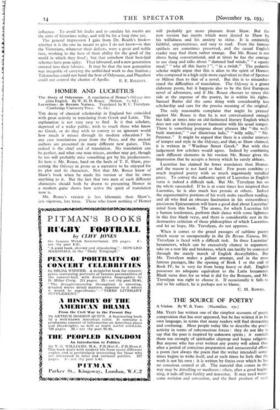HOMER AND LUCRETIUS
The Story of Odysseus. A translation of Homer's Odyssey into plain English. By W. H. D. Rouse. (Nelson. 7s. 6d.) Lucretius : de Rerum Natura. Translated by R. C. Trevelyan.
(Cambridge University Press. 8s. 6d.)
THE decay of classical scholarship in England has coincided with great activity in translating from Greek and Latin. The explanation is not very easy to find. Is it that scholars, deprived of a wider public, wish to touch those who know no Greek, or do they wish to convey to an ignorant world how much it misses through its modern education ? In any case translations pour from the Press, and the ancient authors are presented in many different new guises. This indeed is the chief end of translation. No translation can be perfect, and what one man misses, another may get, though he too will probably miss something got by his predecessors. So here is Mr. Rouse, hard on the heels of T. E. Shaw, pre- senting the Odyssey in prose as a narrative to be enjoyed for its plot and its character's. Not that Mr. Rouse knew of Shaw's book when he made his version or that he owes anything to it. But the fact that two men of such different , characters should both be drawn to presenting Homer in a modern guise shows how active the spirit of translation now is.
Mr. Rouse's version is less idiomatic than Shaw's, less vigorous, less terse. Those who know nothing of Homer
will probably get more pleasure from Shaw. But the new version has merits which were denied to Shaw by his wilfulness and his .anxiety to shine. It is eminently faithful, unpretentious, and easy to read. Even the famous epithets are sometimes preserved, and the casual English reader may find them rather strange. But Mr. Rouse is not above being conversational, and at times he has the courage to use slang and talks about " damned bad winds," " a square meal," " why all this hurry ? ", " in a twink." The pedantic scholar might argue that this is alien to the spirit of Homer, who composed in a high style more equivalent to that of Spenser or Milton than to that of a novel. But this is to misunder- stand the difficulties of translation. The Odyssey is a grand elaborate poem, but it happens also to be the first European novel of adventure, and if Mr. Rouse chooses to stress this side at the expense of the -poetry, he is within his rights. Samuel Butler did the same thing with considerably less scholarship and care for the precise meaning of the original.
The only reasonable complaint that might be pressed against Mr. Rouse is that he, is not conversational enough but falls at times into an old-fashioned literary English which does not suit his purpose or harmonise with his usual temper. There is something pompous about phrases like " the well- built mansion," " our illustrious lady," " willy nilly," " Mr. Patience." It might be argued that there is a similar mixture of temper and style in the Odyssey, and that, as Shaw claimed, it is written in " Wardour Street Greek." But with that judgement few scholars would agree. Indeed by combining such different elements in his version Mr. Rouse gives the impression that he accepts a heresy which he surely abhors.
Lucretius has claimed far fewer translators than Homer, and the reason is not hard to find. Few poets combine S3 much inspired poetry with so much ingeniously versified prose. To convey the authentic spirit of Lucretius in English verse is indeed a difficult task. But Mr. Trevelyan has on the whole succeeded. If he is at some times less inspired than Lucretius, he is also much less prosaic at others. Indeed the argumentative portions of his work make excellent reading, and all who find an obscure fascination in his extraordinary passionate Epicureanism will learn a good deal about Lucretius' mind from this book. The atoms, for which Lucretius felt a human tenderness, perform their dance with some lightness in this free blank verse, and there is considerable zest in the destructive criticism of those philosophies of which Lucretius, and let us hope, Mr. Trevelyan, do not approve.
When it comes to the grand passages of sublime poetry which occur so unexpectedly in the De Reruns Natura, Mr. Trevelyan is faced with a difficult task. In these Lucretius' hexameters, which can be excessively clumsy in argument, take on a new life and briskness, which can hardly be conveyed through the stately march of English decasyllables. But Mr. Trevelyan makes a gallant attempt, and in the most famous passages, like the opening of Book I or the mall of Book IV, he is very far from being heavy or dull. English possesses no adequate equivalent to the Latin hexameter. Blank verse does for us what it did for the Romans, and Mr. Trevelyan was right to choose it. If occasionally it fails to rise to his subject, he is perhaps not to blame.
C. M. BOWRA.
















































































































 Previous page
Previous page